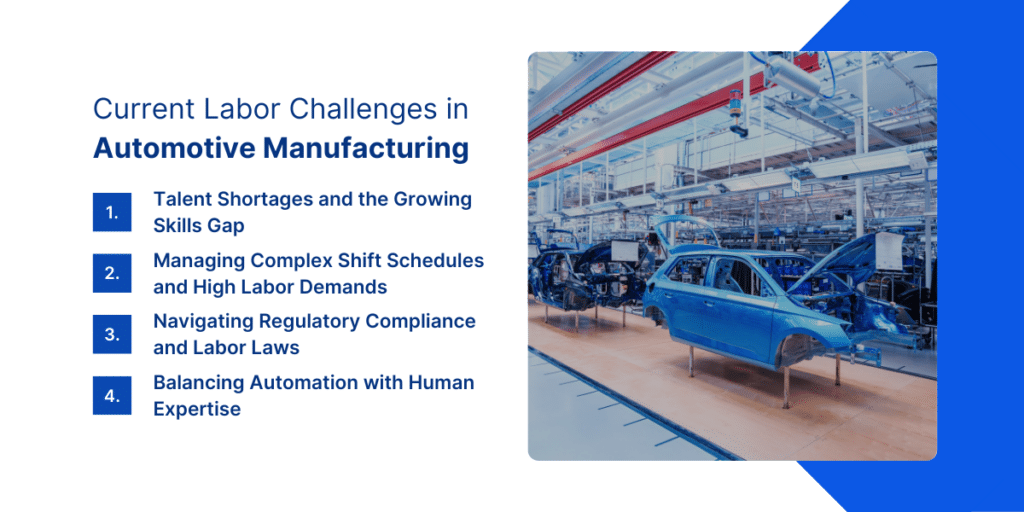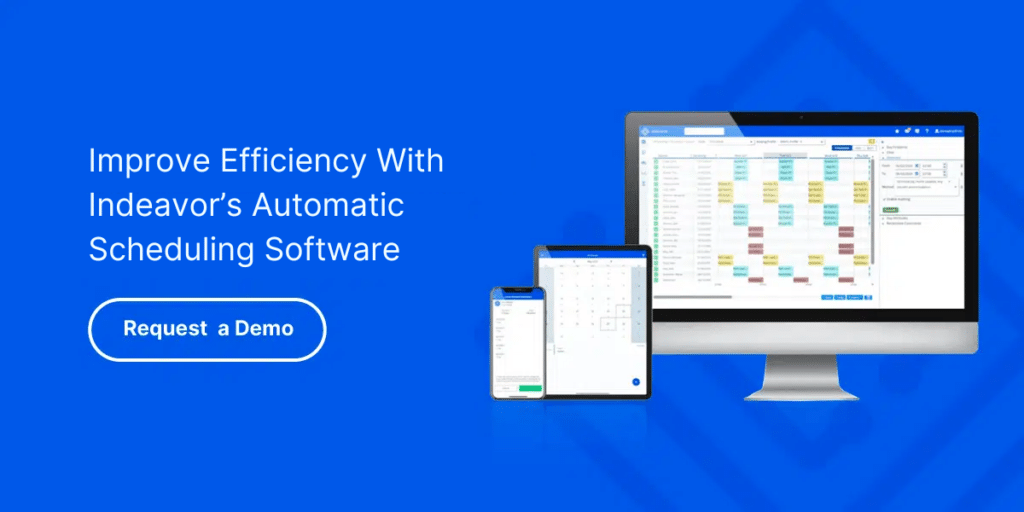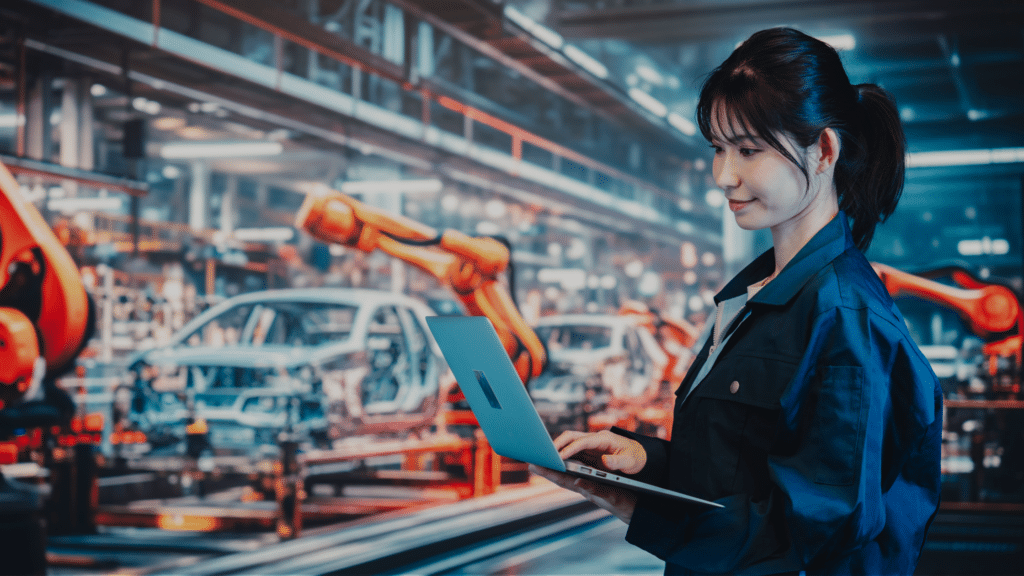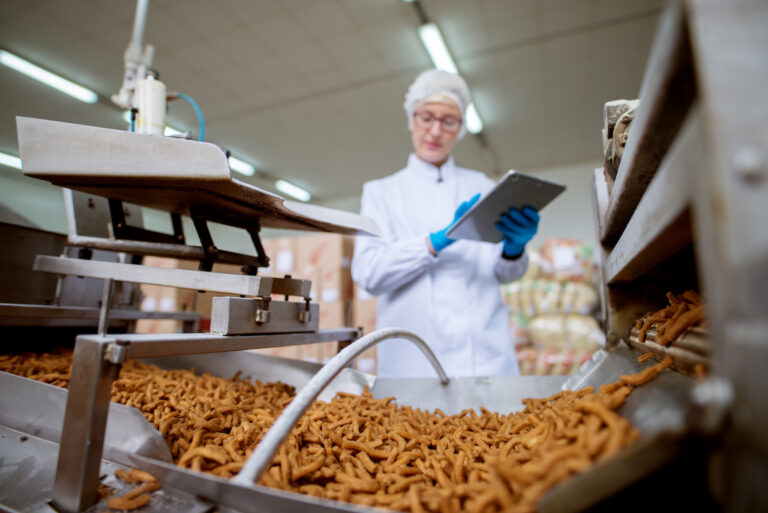The automotive manufacturing sector is at a pivotal moment, driven by advancements in technology, evolving workforce expectations, and increasing global competition. As demand for electric vehicles (EVs), autonomous driving, and sustainable manufacturing practices grows, manufacturers must rethink how they manage their workforce.
Aligning labor strategies with modern automobile manufacturing processes is essential to maintaining efficiency, ensuring compliance, and fostering innovation. With a mix of automation and skilled human labor, manufacturers must embrace new workforce solutions to stay competitive in this rapidly evolving industry.
What is Automotive Manufacturing?
Automotive manufacturing refers to the process of designing, assembling, and producing vehicles at scale. This industry is one of the most complex manufacturing sectors, requiring precise coordination across engineering, supply chains, labor management, and production lines.
Key stages in automotive manufacturing processes include:
- Design & Engineering – Creating vehicle concepts, prototypes, and final blueprints.
- Supply Chain Management – Sourcing materials, parts, and components from global suppliers.
- Assembly & Production – Using automation, robotics, and skilled labor to build vehicles efficiently.
- Quality Control & Compliance – Ensuring safety, durability, and regulatory compliance before market release.
As auto manufacturing evolves, manufacturers must integrate new technologies while maintaining a skilled workforce to oversee and manage production efficiency.
What Do Automotive Manufacturers Do?
Automotive manufacturers oversee the end-to-end production of vehicles, ensuring that every stage—from concept to assembly—is optimized for efficiency and quality. Their core responsibilities include:
- Designing and engineering vehicles to meet consumer demands and safety regulations.
- Managing production lines that integrate automated systems and human workers.
- Maintaining supply chains to ensure timely delivery of vehicle components.
- Ensuring compliance with international and US automotive manufacturing regulations.
While automation has transformed the industry, human expertise remains essential for managing processes, troubleshooting machinery, and ensuring quality control.

Current Labor Challenges in Automotive Manufacturing
The manufacturing sector faces increasing labor challenges that are impacting both production efficiency and operational agility. As market demands evolve and production requirements become more complex, manufacturers are tasked with adapting their labor strategies to ensure continuous productivity.
These challenges are compounded by factors such as a shrinking skilled labor pool, increasing regulatory demands, and the need to integrate automation without sacrificing human expertise. As such, addressing these concerns is critical to maintaining competitiveness and operational stability.
1. Talent Shortages and the Growing Skills Gap: As experienced automotive manufacturing workers retire, manufacturers struggle to fill critical roles with skilled labor. The need for digital literacy and expertise in automation adds further complexity to hiring and training efforts.
2. Managing Complex Shift Schedules and High Labor Demands: Auto manufacturing plants operate around the clock, requiring precise workforce scheduling to maintain productivity while avoiding burnout and compliance violations. Manual scheduling methods often lead to inefficiencies and gaps in shift coverage.
3. Navigating Regulatory Compliance and Labor Laws: From occupational safety to wage regulations, manufacturers must adhere to strict labor laws. Non-compliance can result in fines, production delays, and reputational damage.
4. Balancing Automation with Human Expertise: While automation improves efficiency, human oversight is still required for decision-making, equipment maintenance, and quality control. Striking the right balance between machine-driven processes and skilled labor is key to operational success.
Technology-Driven Solutions for Workforce Optimization
To address labor challenges and improve operational performance, manufacturers are increasingly turning to advanced workforce management technologies. These tools not only streamline processes but also help mitigate the risks associated with labor shortages, compliance issues, and inefficient scheduling. By incorporating real-time data, predictive analytics, and mobile solutions, manufacturers are better equipped to align their workforce with fluctuating production demands, driving greater efficiency and reducing operational downtime.
Real-Time Scheduling
Automated scheduling platforms are central to optimizing labor allocation in dynamic environments. These tools allow manufacturers to assign workers to the appropriate tasks based on real-time production needs, ensuring that each shift is staffed according to demand. With the ability to adjust schedules on the fly, manufacturers can avoid common pitfalls like understaffing or overstaffing, which can lead to inefficiencies, delays, and unnecessary labor costs. Real-time adjustments help keep production on track while minimizing the risks of costly disruptions.
Labor Demand Forecasting
Predictive analytics harness the power of historical data to forecast labor needs, giving manufacturers the insights they need to plan ahead. By analyzing patterns in workforce data, such as seasonal trends, production cycles, and staffing requirements, predictive tools can project future labor demands with a high degree of accuracy. This capability allows manufacturers to reduce downtime caused by labor shortages, optimize shift assignments, and more effectively balance labor costs with production goals. Predictive analytics not only improve operational efficiency but also contribute to long-term cost savings.
Upskilling Employees
With rapid technological advancements in manufacturing, upskilling the workforce is a critical priority. Competency management systems enable manufacturers to track employee skills, certifications, and qualifications in real-time. This data helps identify areas where additional training or development is needed, ensuring that the workforce remains adaptable to new technologies and processes. By offering targeted upskilling programs, manufacturers can close competency gaps, enhance employee performance, and increase overall productivity, all while fostering a culture of continuous learning and improvement.
Flexible Scheduling
Mobile workforce solutions are transforming how workers manage their schedules and interact with their employers. These tools offer employees greater visibility into their shifts and allow them to make adjustments as needed, such as requesting shift changes or trading shifts with colleagues. This flexibility helps increase job satisfaction, leading to lower absenteeism and higher retention rates. Additionally, mobile solutions empower workers to better balance their personal and professional lives, improving morale and productivity. In turn, manufacturers benefit from a more engaged and flexible workforce that can quickly adapt to evolving production needs.

The Role of Workforce Management in Future-Proofing Auto Manufacturing
Adopting workforce management solutions enables automotive manufacturing to stay agile in a competitive industry by streamlining operations, improving decision-making, and fostering workforce adaptability. With access to real-time workforce data, manufacturers can make informed decisions that optimize labor allocation, reduce downtime, and enhance overall efficiency.
Automated workforce solutions play a crucial role in eliminating manual scheduling errors, ensuring that production lines are fully staffed while avoiding unnecessary labor costs. These systems also help organizations maintain compliance with industry regulations by accurately tracking employee hours, overtime, and required certifications, reducing the risk of violations and associated penalties.
Beyond operational efficiency and compliance, workforce management solutions support a culture of continuous learning and innovation. Through structured competency tracking and targeted development programs, manufacturers can upskill their workforce, ensuring employees remain adaptable to evolving technologies and future production demands.
Why Indeavor’s Solutions Drive Success in Automotive Manufacturing
Indeavor’s workforce management platform provides tailored solutions that help manufacturers optimize labor strategies and maintain compliance. By automating shift planning, Indeavor ensures that workforce coverage aligns with production needs, effectively minimizing labor inefficiencies. This streamlined scheduling approach allows manufacturers to stay agile and responsive to shifting production demands.
With built-in compliance tracking, Indeavor helps manufacturers mitigate the risks associated with labor law violations, reducing the likelihood of costly penalties. The platform also supports scalable solutions, making it adaptable to both single-plant operations and large-scale, global manufacturing environments.
Indeavor’s mobile workforce solutions empower employees with self-service scheduling capabilities, promoting flexibility while maintaining staffing levels required to keep production lines fully operational. This balance between flexibility and productivity ensures that labor strategies remain effective without sacrificing output.
The future of automotive design and manufacturing depends on the seamless integration of technology and human talent. By investing in workforce management solutions, manufacturers can overcome labor challenges, improve efficiency, and maintain compliance in an increasingly automated industry.
Discover how Indeavor’s automotive manufacturing solutions can streamline operations—optimize your workforce today—book a demo.
About the Author
Claire Pieper is the Digital Marketing Specialist for Indeavor. In her role, she specializes in crafting strategic and engaging content, ensuring that customers are well-informed. Claire is dedicated to enhancing the customer experience and optimizing the user journey through Indeavor’s solutions. To learn more or get in touch, connect with Claire on LinkedIn.



